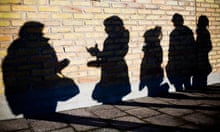A vulnerable university student who twice tried to kill herself was left for a month without anti-depressant medication before she was found dead, an inquest has heard.
Natasha Abrahart was concerned she could lose her place on a prestigious science course and university GPs had concluded she was a high suicide risk, the court was told.
The 20-year-old was referred to local mental health services and initially prescribed anti-depressants. But the inquest heard she had been left with no medication for a month.
In addition, two university GPs who saw Abrahart did not pass on their concerns to her course leaders or contact the vulnerable student support service about her.
Twelve students at Bristol University have, or are suspected of having, killed themselves since September 2016. Abrahart died on 30 April 2018 at her shared flat in the city.
Her parents, Margaret, a retired psychological wellbeing practitioner, and Bob, a retired associate professor at the University of Nottingham, have expressed deep misgivings about how the university looked after their daughter.
At the start of the inquest, Margaret said her daughter was bright but very shy, had chosen a challenging four-year master of science degree and became concerned about her studies in her second year.
“She seemed very worried about being kicked off the MSc course ... My strong impression is that she would have considered this to be a huge failure,” Margaret said.
She spoke of how hard it was to get her daughter to discuss her problems. “I found it very difficult to know how far to push her,” she said. “I decided I just had to trust the professionals even though it felt acutely uncomfortable.”
The court heard that Abrahart self-harmed by cutting herself, and tried to kill herself twice, in February and March last year.
Dr Caroline St John Wright saw Abrahart at the student health service on 20 February after the first attempt. The GP concluded she was in an “acute state of distress” and made an urgent referral to the Avon and Wiltshire mental health partnership trust (AWP).
A member of the AWP crisis team found out that one of Abrahart’s triggers was a module on her course that required her to be assessed through an interview. Her shyness made this difficult for her.
Abrahart tried to kill herself again on 20 March. Another university GP, Dr Emma Webb, saw her the day after and again on 20 April.
Webb asked Abrahart if she was prepared for her university exams. When the student said no, Webb advised her to talk to her academic department.
Earlier, Abrahart had been given seven anti-depressant tablets but the court was told that, for a month, she did not appear to have any of the medication.
On 20 April, Webb gave Abrahart a two-week supply of anti-depressants and asked her to return in two weeks’ time. She died before the next appointment.
Her family’s barrister, Tom Stoate, told the court: “The system appears to have left a suicidal student without medication for a period of one month.”
Stoate also flagged up guidelines from the National Institute for Health and Care Excellence (Nice) that say a patient such as Abrahart should be seen again after a week. He suggested the GPs might have contacted the vulnerable student support service.
Webb said the student health service’s procedure in such a case was to wait two weeks before a follow-up appointment. She said it was not normal practice to discuss a student with her academic department.
Asked why she had not referred Abrahart to the vulnerable student support service, Webb said AWP had been leading and coordinating the care.
The inquest continues.
In the UK, Samaritans can be contacted on 116 123 or email jo@samaritans.org. In the US, the National Suicide Prevention Lifeline is 1-800-273-8255. In Australia, the crisis support service Lifeline is 13 11 14. Other international suicide helplines can be found at www.befrienders.org.










